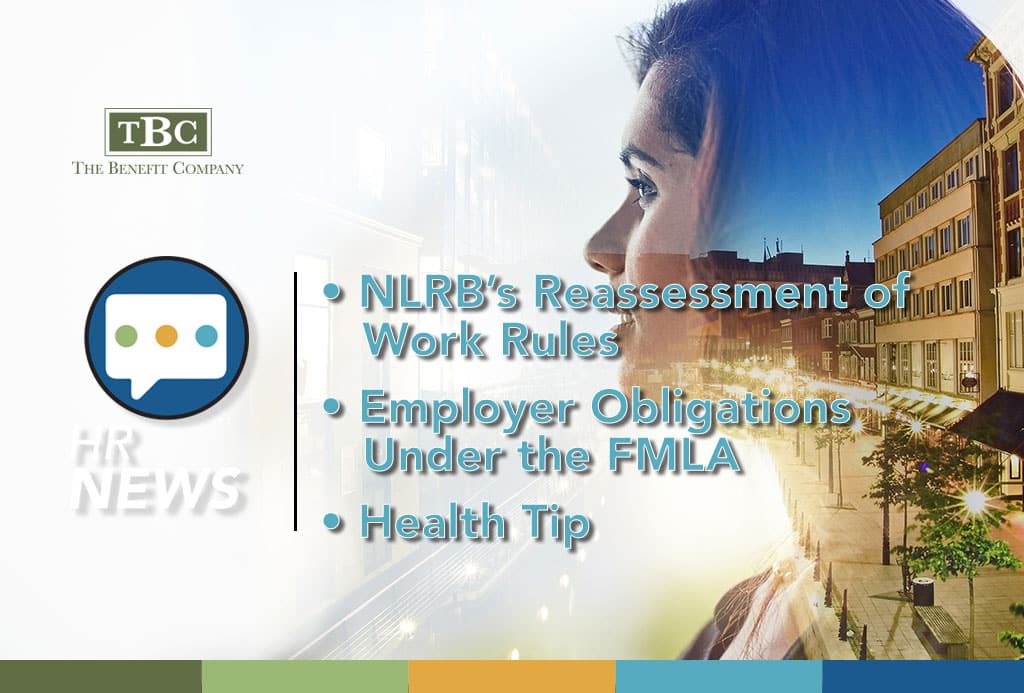Legal Updates & Reminders…
- June 25: NC Gov. Roy Cooper signed a bill expanding opportunities for employment of individuals with criminal records (no more than 3 Class H or I felonies and any misdemeanors), by shielding employers from negligent hiring claims if they relied on the ‘certificate of relief’ given to these individuals by the state. This law is effective December 1, 2018, and applies to petitions for the certificate filed on or after that date.
- June 28: The U.S. Supreme Court found that states and public-sector unions may no longer have union dues deducted by non-consenting employees. Employees must choose to support the union before dues may be deducted from their pay.
- July 2: On this date 54 years ago, President Lyndon Johnson signed the Civil Rights Act of 1964, prohibiting discrimination in employment, education, voting, public accommodations, and also established the Equal Employment Opportunity Commission (EEOC).
The NLRB’s Reassessment of Employer’s Work Rules
You have probably read about legal issues some employers have encountered, with company Handbook work rules that the National Labor Relations Board (NLRB) deemed to negatively impact employees’ ability to exercise their ‘Section 7’ rights. In a nutshell, Section 7 of the NLRA involves employees’ rights to unionize, and to join together to advance their interests as employees, and to refrain from such activity. Employers cannot interfere with these employee rights.
Good news, though! The General Counsel of the NLRB just issued guidance to their Regional Directors, following a decision earlier this year involving The Boeing Company. In essence, the Board is recognizing a more reasonable balance between the rights of employees, and the rights of employer business interests. As a result of the Boeing case, guidance is provided to place work rules in one of three categories:
- Category 1: Rules that are generally lawful for employers to maintain. Rules in this category include–
- Civility rules, including behavior that is rude, condescending, socially unacceptable, or disparaging company employees;
- No-photography and no-recording rules, prohibiting employees from recording telephone or other conversations they have with a coworker, manager or a third party, unless such recordings are approved in advance;
- Rules against insubordination, non-cooperation, or on the job conduct that adversely affects operations;
- Disruptive behavior rules, include boisterous conduct, creating a disturbance on company premises or creating discord with clients or fellow employees;
- Rules protecting confidential, proprietary and customer information or documents;
- Rules against defamation or misrepresentation include email messages that are defamatory or misrepresenting the company’s products or services or employees;
- Rules against using company logos or intellectual property, without prior written approval;
- Rules requiring authorization to speak for the company;
- Rules banning disloyalty, nepotism or self-enrichment.
- Category 2: Employer rules warranting individualized scrutiny, to determine whether any adverse impact to employee rights would be outweighed by legitimate employer justification. These rules include:
Confidentiality rules broadly encompassing “employer business” or “employee information” (as opposed to confidentiality rules regarding customer or proprietary information, or confidentiality specifically directed at employee wages, terms of employment or working conditions); and
Disparagement or criticism of the employer (as opposed to civility rules regarding disparagement of employees).
- Category 3: Rules unlawful for employers to maintain, include:
- Confidentiality rules specifically regarding wages, benefits or working conditions, and
- Rules against joining outside organizations or voting on matters concerning the employer
This is very helpful guidance from the NLRB, and should make employers feel more confident in retaining work rule policies probably currently held in their Handbooks.
Employer Obligations under the FMLA
The FMLA has got to be the most confusing and convoluted law employers have to deal with every day! It is probably also the most frequent topic of seminars to assist employers in figuring it out. And when we combine it with obligations under the ADA or Workers Compensation, it’s time for HR staff to make a claim themselves—
Seriously though, there are some basic obligations we need to stay on top of, most of which are not too taxing. Be sure you:
- Post the most updated FMLA poster in each of your worksites, in an area where your employees are likely to see it;
- Have an FMLA policy, and be sure it is distributed to employees via your Employee Handbook or some other mechanism;
- Advise employees in writing whether their FMLA request is approved or denied, including all required designation notices, within the required timeframes;
- **Properly track FMLA and advise your employee of the amount of leave remaining, when requested to do so;
- Be sure you don’t retaliate or interfere with an employee’s right to take FMLA leave.
**Properly tracking FMLA leave, especially if intermittent leave is involved, can be a nightmare. Do the best you can. When in doubt, consider giving the employee the benefit of the doubt by erring in their favor. No matter what, make sure the easy items above are handled as there isn’t a good excuse not to get those right.
Bring a Pen to the Doctor’s Office
Why? The receptionist will certainly have one for you to use, to complete the usual paperwork required to update your address and insurance, and sign the HIPPA notice. But think about who is already in the waiting room: sick people, who have just used the pen the receptionist gave to you! You have your own germs to worry about, or you probably wouldn’t be there. Consider taking and using your own pen the next time you have a doctor appointment.
******************************************************************************
This newsletter is not intended to provide legal guidance to you. We welcome your input on topics you would like to learn more about. We encourage you to contact the author of this newsletter, Caryl Kuchman, SPHR, SHRM-SCP at 803.729.8398 or at [email protected] if you have questions on any information presented.
 The Benefit Company
The Benefit Company